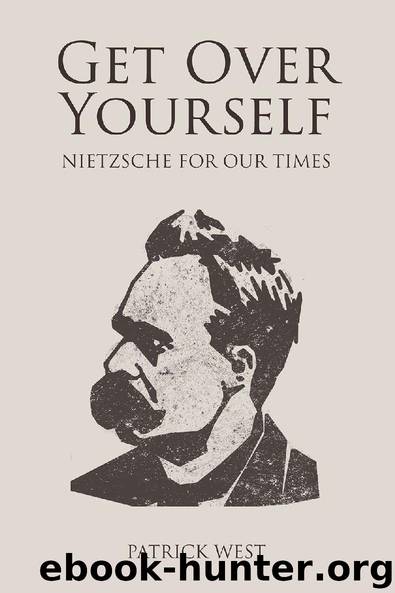Get Over Yourself by Patrick West

Author:Patrick West
Language: eng
Format: epub
Tags: Nietzsche, culture, modernity, existentialism, nihilism, identity politics, twitter, therapy culture, fundamentalism, virtue signalling, twitterstorms, twitter storms, dumbing down, society, humanity, superman, herd instinct, will to power
ISBN: 9781845409548
Publisher: Andrews UK Limited 2017
Published: 2017-10-24T00:00:00+00:00
3. Live Dangerously! Safe spaces
Ours is an age which puts “safety first”, whether it be through risk assessments at work, the much dreaded and sometimes mythologised “health ‘n’ safety” brigade, the precautionary principle in the field of science or “safe spaces” on university campuses. Ours is a time in which to give “offence” is a grievous transgression, and in which people are easily “traumatised” by contrary or hurtful ideas in university lectures, or day-to-day encounters in the form of “microagressions”. Hence trigger warnings on books to protect the vulnerable, and teachers no longer blowing whistles in school playgrounds lest they upset children. Hence, too, students being permitted to absent themselves from lectures in which they might be “distressed” by controversial topics. The young seem especially delicate in these safety-seeking times, with a report from July 2016 finding almost half of voters aged 18 to 24 cried or felt like crying when they heard that the UK had voted to leave the European Union ( Guardian, 02/07/16). This is what they call “Generation Snowflake” (because they “melt” so easily).
Nietzsche would regard the quest for safety as a negation of life, demands for “health and safety” as a ludicrous barrier to the free spirit of inquiry and exploration. Life necessitated strife and struggle. We must live dangerously. Children seek risk to test their limits and to extend their limits - witness how infants will walk on walls and climb trees. Life demands that we take risks and place ourselves in sometimes mortal peril. The ascent of Everest, the discovery of the New World, men on the Moon: such achievements were made by those who embraced risk. “The devotion of the greatest is to encounter risk and danger and play dice for death”, spoke Zarathustra (TSZ OSO). Galileo offended the Papacy with his quest for truth, Darwin offended many with the theory of evolution. Sometimes there is an imperative to be offensive. As a young Nietzsche wrote to his sister: “if you wish to strive for peace of soul and pleasure, then believe; if you wish to be a devotee of truth, then inquire” (letter to his sister, 11/06/65; quoted in Kaufmann, 1974, p. 21). Nietzsche would laugh in the face of “safe spaces”. He would urge that we create “dangerous spaces”. As he summed it up in 1888: “It is no small advantage to live under a hundred swords of Damocles: that way one learns to dance, one attains ‘freedom of movement’” (WTP 771).
Nietzsche called “the essence of life... the priority of the spontaneous, attacking, overcoming, reinterpreting, restructuring and shaping forces” (OTGM 2.12). The truly free, joyful man is one who lives without foundations or walls in a permanent and perpetual state of doubt. “Who will prove the strongest? The most moderate, those who need no extreme tenets of faith” (cited in Jaspers, 1961, p. 94). This dangerous undertaking required fortitude. “The desire for a strong faith is not the proof of a strong faith, rather the opposite.
Download
This site does not store any files on its server. We only index and link to content provided by other sites. Please contact the content providers to delete copyright contents if any and email us, we'll remove relevant links or contents immediately.
The remains of the day by Kazuo Ishiguro(8947)
Tools of Titans by Timothy Ferriss(8346)
Giovanni's Room by James Baldwin(7301)
The Black Swan by Nassim Nicholas Taleb(7086)
Inner Engineering: A Yogi's Guide to Joy by Sadhguru(6776)
The Way of Zen by Alan W. Watts(6575)
Asking the Right Questions: A Guide to Critical Thinking by M. Neil Browne & Stuart M. Keeley(5740)
The Power of Now: A Guide to Spiritual Enlightenment by Eckhart Tolle(5723)
The Six Wives Of Henry VIII (WOMEN IN HISTORY) by Fraser Antonia(5484)
Astrophysics for People in a Hurry by Neil DeGrasse Tyson(5169)
Housekeeping by Marilynne Robinson(4420)
12 Rules for Life by Jordan B. Peterson(4292)
Double Down (Diary of a Wimpy Kid Book 11) by Jeff Kinney(4252)
The Ethical Slut by Janet W. Hardy(4232)
Skin in the Game by Nassim Nicholas Taleb(4223)
Ikigai by Héctor García & Francesc Miralles(4219)
The Art of Happiness by The Dalai Lama(4115)
Skin in the Game: Hidden Asymmetries in Daily Life by Nassim Nicholas Taleb(3973)
Walking by Henry David Thoreau(3938)
